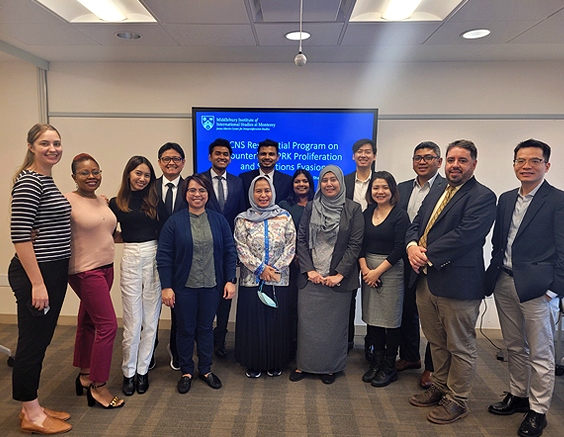January 3, 2022
Ian Stewart, Sophia Poteet, Nomsa Ndongwe
The CNS Washington, DC office recently held a weeklong residential program focused on the implementation of United Nations Sanctions on the DPRK for participants from eight countries across South and Southeast Asia in November of 2022. The program was a timely opportunity to reengage countries on implementation of sanctions, particularly due to the changes in North Korean sanctions evasion during the COVID-19 pandemic.

Participants with Varied Backgrounds
CNS hosted participants from Bangladesh, Indonesia, Malaysia, the Philippines, Sri Lanka, Taiwan, Thailand, and Viet Nam. The participants’ backgrounds ranged from trade ministries, foreign ministries, to financial intelligence unit staff and prosecution. This mixture of professions demonstrates the breadth of expertise and responsibilities necessary to fully implement UNSCRs on North Korea.
Trends and Tactics of North Korean Sanctions Evasion
The week-long program explored the scope and requirements of UN sanctions as well as the trends and tactics of North Korean sanctions evasion. The scope included exploring each element of the UN sanctions regime as well as the overlap with other areas, such as export controls and proliferation finance controls. Presentations during the program examined sanctions related to maritime vessels, finance, labor and DPRK nationals, dual-use goods, luxury goods, joint ventures, and scientific cooperation, amongst others. The breadth of sanctions areas covered in the program underscores the necessity of multistakeholder cooperation and collaboration for effective implementation of UN sanctions.
CNS staff and outside experts also provided an overview of the tactics the DPRK typically uses to evade sanctions. Speakers examined more recent trends and tactics related to maritime activity and cyber and cryptocurrency theft, noting that North Korean sanctions evasion trends and tactics have evolved in the wake of the COVID-19 pandemic and the resulting supply chain disruptions. As the country resumes international trade in the post-COVID-19 pandemic world, it will be important to closely monitor North Korean sanctions evasion going forward.
The week culminated with a set of case study exercises where participants worked together to identify and address hypothetical cases of North Korean sanctions evasion. The robust discussion which followed emphasized both the variety of approaches taken in implementing sanctions and the commonalities of challenges faced by countries in the region regarding North Korea’s sanctions evasion.
Participants Shared Experiences in Sanction Implementation
Highlights from that exercise were lessons participants shared from their own experiences implementing sanctions, as well as their observations on potential areas for improvement. A key challenge highlighted during discussions was the legal and enforcement mechanisms necessary to implement maritime sanctions. The legal and enforcement basis for maritime sanctions among some of the participating countries is limited. As such, it was clear that further work is needed to strengthen maritime sanctions implementation in the region. One participant stated that it was “high time” for their country and countries in the region to take the necessary steps to implement sanctions.
CNS will remain engaged with the participants including to fill gaps in national implementation where they were identified. CNS looks forward to hosting further programs like this in the future.
